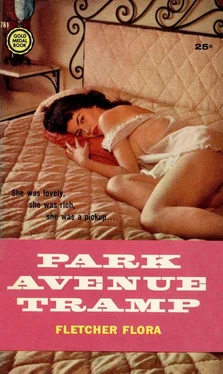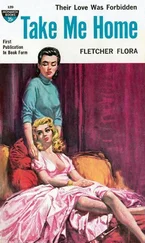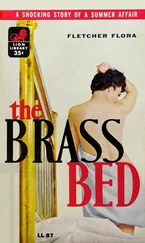Afterward, she poured another and held it in her hands and sat down in a deep chair. This second one she sipped, and she was perfectly right, as she had been before in identical circumstances. Her head began to feel better at once, clearer and less painful, and the only disadvantage to this was that she began to think clearly of Joe Doyle and to want to be with him again. Remembering the night and its excitement, she remembered also his bad heart, and it occurred to her that the excitement had probably not been good for the heart. What if he had died in her arms? This would have been a great shock and a terrible complication, but at the same time there was in the idea a quality of total consummation that was at once thrilling and. terrifying. She did not wish to go on thinking like this about Joe Doyle, and so she began to think instead about her father, who was dead. Thinking about her father always made her feel lost and lonely, even so long after he had died, but thinking about him had at least the comfort of escape, for it was necessary to go away in her mind from this time and place.
When she went away in her mind to think about her father, she seemed always to go to the same place in the beginning, and this place was the street that ran in front of the house in the town in which she used to live, and the time of her arrival there was always evening of a summer day. The street was sad and lovely on summer evenings, and it ran both ways into a kind of eternal bittersweet status quo in which nothing ever changed. Great oaks and elms and maples grew in the parkings on both sides and touched leaves above, and below the overhead arc of limbs and leaves it was cool and shadowed, with just enough filtered light to make things softly visible, and among the leaves were a thousand singing cicadas.
She was standing by the street in front of the house, and she felt very sad and in love with herself, and she turned and walked slowly up the walk from the street to her house, which was one of the finest houses in town, and on the walk coming toward her was her father, whom she loved more than anyone on earth, even including herself. They met on the walk, and her father put his arms around her and held her and stroked her hair. Nothing was said, not a word by either of them, and after a while he released her and went on down the walk, and. she went on in the opposite direction toward the house, and that was the end of the way she seemed always to start thinking about her father. Maybe it was something that had actually happened, but she couldn’t remember that it had happened in just such a way at such a time, and it was more likely that it was only an association of imagery that stood together for the way she had felt about him.
James McAdams, her father, was the only man she ever loved with the simple, asexual love of a child, and all loves that followed were corruptions. When she was fourteen, he died suddenly in an automobile accident, and everyone thought at the time that she was very brave and stoical because she did not cry or display her grief, but the reason she didn’t was that she was too numbed by pain and too terrified by the realization that she lived in a world where something like this could happen to someone like him, and collaterally to her. After his burial, while her mother in smart black was receiving the sympathy of relatives and friends in the living room, she locked herself in her own room alone and finally cried bitterly for a long time in the terrible emptiness in which he had left her, and after that she never cried again for any reason, although many things happened to her that were worth crying about.
She knew other men, of course, and as she grew older she knew far too many for her own good, but she never quite knew why she did, or why she kept making the complete concessions that she made, the repeated sacrifice of herself. The truth was, having lost the best man of all, she despised all others. Having given to the best man her best love, she was compelled to give a lesser love to all who followed, and the love she gave, although she would never know it, was a necessary expression of her contempt and despair.
At the age of eighteen, she was sent to a good college for young women in New York. She was already becoming a considerable problem, having acquired a limited notoriety at home, and it was felt that college would give her new interests and a new direction, but it didn’t. As a matter of fact, it proved to be an almost intolerable burden, so far as she was concerned, and after completing the first year and slightly more than half the second, she was suspended for failure to make satisfactory marks. Her scholastic failure was genuine enough, but it was also a fortunate convenience for the authorities at the school, for there were other matters for which she could have been suspended or expelled, and it was practically certain the punitive action could not have been avoided much longer.
Home again, she was again a problem. She seemed always to be in a fever of excitement or in a paralysis of depression, and in the fever there were far too many affairs with random men and far too much of the drinking that increased steadily as she grew older, and in the paralysis there was also too much drinking, although she did not then see any men or want to see any. Her mother suggested that she consult a doctor, meaning specifically a psychiatrist, but Charity refused. Three times she considered deliberately what it would be like to die, and what would be the most agreeable way to accomplish death, but she never even came to any conclusion, let alone reaching a point of taking any action, and she wondered afterward if she were actually seriously considering death at all, and if she would not be too great a coward to kill herself for any reason whatever.
Then she met Oliver Alton Farnese. There was a local Farnese, a cousin to Oliver and a relatively poor relation, although he was by local standards affluent enough. Oliver had come from New York on a matter which was a combination family-business deal that was not publicized and not generally known but concerned, in fact, a loan that the local Farnese was trying to secure. Oliver usually had nothing much to do with Farnese business, but in this case, since it was a relatively unimportant matter that concerned a cousin, he was allowed to handle it. It gave him something to do and made him feel useful.
Charity met him at a dinner party to which she went reluctantly with her mother, and three weeks later, two weeks after Farnese had planned to return to New York, she married him quietly in the chapel of the Episcopal church. The marriage was considered by Charity’s mother as an incredible stroke of the best possible luck. In a way this was so, for it solved for her a serious problem that she was utterly incapable of solving herself. For Charity it really solved nothing, but she at least thought rationally about it and married Farnese deliberately for two good reasons. In the first place, she thought it would be pleasant to live on Park Avenue in New York City and have all the money she could possibly spend. In the second place, she did not love him in the least and therefore felt no emotional commitment to him. If she had loved him, she wouldn’t have married him.
Now she had thought herself from Joe Doyle to James McAdams to Oliver Farnese, and she was in danger of coming around the circle to Joe Doyle again, the same way one came by her theory around the circle from good to bad or bad to good, and what she needed to do and had better do was to think constructively about Oliver, how she could most convincingly tell him all necessary lies when he came home, which would be soon. She looked at the little electric clock beside her bed and saw that it would be, in fact, exactly twenty-five minutes from now, at six o’clock, and she knew this definitely because Oliver always knocked on her door at six o’clock if he did not see her first in some other part of the apartment. Of course, she wasn’t always in the apartment at all, when he came home, but she was certain that he knocked on the door of her room those times too, for it was part of his schedule.
Читать дальше












